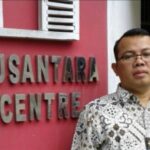« Indonesia’s independence is not our ultimate goal. Independence is merely a prerequisite for achieving justice, happiness, and prosperity for all citizens, » said the proclamator Mohammad Hatta (1902-1980).
To achieve these three goals, we need the rule of law. Therefore, when the national economy operates without legislation, it signifies an unacceptable void.
Today, Indonesia faces a peculiar reality. We have gained political independence but still lack a sufficient legal foundation to fully regulate the national economy. Everyone is busy crafting national political laws while neglecting national economic legislation.
Yet, Article 33 of the 1945 Constitution has long outlined the direction of Indonesia’s economy: socially just, based on familial principles, and grounded in economic democratization.
However, to this day, there is no comprehensive omnibus law that truly binds the national economic system according to this mandate.
The absence of a National Economic Law has led to fragmented, partial, and often conflicting economic policies. Without a unified legal framework, each ministry and economic institution operates based on its own sectoral logic.
The impact is not just overlapping policies but also the loss of direction and future economic orientation, which should guarantee structural justice for all citizens. The flood of poverty, unemployment, and inequality is undeniable proof of this legislative gap.
The national economy is, in essence, a collective expression of how a nation interprets sovereignty. It is not merely a number in GDP reports or import-export statistics.
It is how we manage land, water, and air for the greatest shared prosperity. It is about granting citizens space, access, and rights to the means of production, rather than sidelining them with biased free-market logic.
Moreover, the absence of a national economic law has allowed uncontrolled liberalization. Public commodities that should be state-controlled are commercialized. State assets are privatized.
Citizens’ interests are displaced by investment pressures and corporate expansion. All this occurs without adequate legal protection because our legislative framework remains empty in its most vital aspects. Thus, we must ask, « Who truly owns this nation’s economy? » The answer lies clearly in our constitution.
Article 33 states that land, water, and natural resources are controlled by the state and must be used for the people’s prosperity. Vital production sectors affecting public welfare must be state-controlled. These are not mere ideological rhetoric but constitutional mandates awaiting clear, operational legislation.
In such circumstances, citizens must not remain silent. We cannot leave economic legislation solely to political elites or technocrats working behind closed doors—let alone allow the trading of legal clauses.
Citizens, communities, academics, and activists must participate in drafting a national economic law that truly sides with the people. Because the economic democracy envisioned by the constitution cannot thrive if legislative democracy dies.
This process is not just a legal technicality. It is a matter of historical direction. Will Indonesia become a nation that lets the economy be controlled by markets and capital, or one that regulates the economy to achieve social justice and citizen sovereignty?
This is where citizen participation becomes crucial—not just as aspiration but as constitutional power to shape the future. We need laws that protect, strengthen, and develop people’s economic institutions like cooperatives, state-owned enterprises, and micro-businesses.
Not laws that facilitate privatization or reduce citizens to mere consumers and aid recipients. We need legislation that restructures the system to make mutual cooperation a working principle, not a normative slogan defeated by manipulative practices.
National economic legislation must begin with political courage and collective awareness that economic direction cannot be left to market forces alone. It must return to the spirit of the archipelago, Indonesian identity, and the noble values of Pancasila.
Because the economy is not a tool to enrich a select few but a medium to achieve shared welfare, dignity, and just humanity.
If we want a sovereign, dignified, and globally leading economic future, there is no reason to delay. The National Economic Law must be drafted, discussed, and enacted—not by elites but by all citizens.
Why? Because a national economy without law is a void. And that void will only be filled by the strongest, not those most in need and deserving.
Remember this advice: « When wealth accumulation no longer serves high national and social interests, a great shift in moral code will occur (John Maynard Keynes, 1883-1946). » Let us begin now.
Necessity and Constitutional Mandate
On sovereign economics, Adam Smith (1723-1790)






